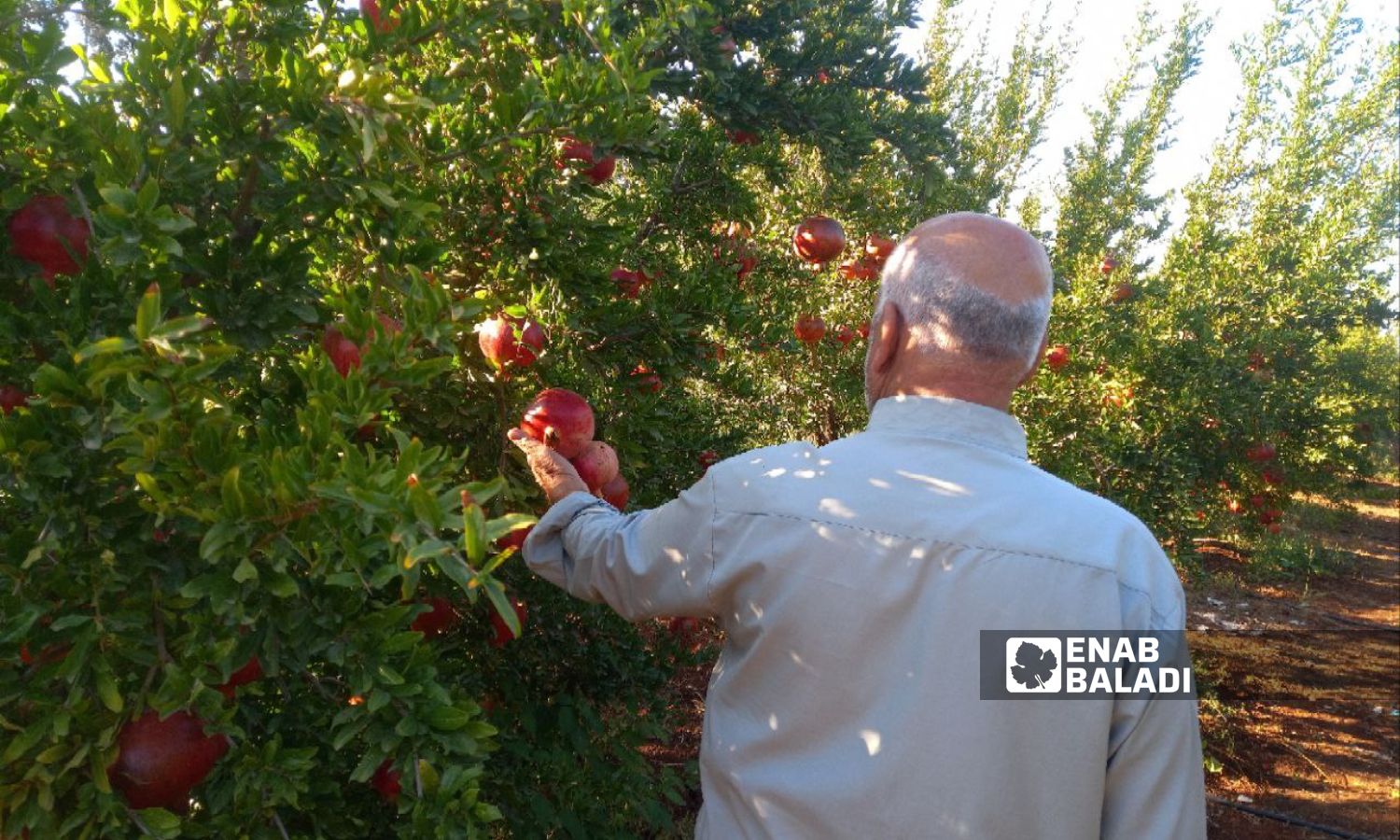



Daraa – Halim Muhammad
To avoid losses resulting from the decline in the trading value of the Syrian pound, farmers in the southern Daraa governorate recorded their deferred debts to merchants resulting from selling crops before they were harvested in US dollars.
The Syrian pound is witnessing a continuous decline in its value, as the selling price of one dollar during the past week reached 13,700 pounds for every one dollar, according to the S-P Today website, which covers the trading rate of the Syrian pound to the dollar. At the start of the conflict in 2011, the dollar was trading at 47 pounds.
Sales operations lack any legal mechanism that protects farmers from fraudulent operations, which prompted some of them to conclude contracts and fix the price in foreign currencies.
It is customary in Daraa to sell fruitful crops to the merchant immediately before the harvest date as part of what is known as the “land guarantee,” which is an agreement between the merchant and the farmer to sell the crop for a price determined by both parties in Syrian pounds, with the merchant paying the amount in installments that may extend for a period of time of up to three months. This prompted farmers this season to fix the amount in dollars.
| Land guarantee is the process of leasing the land to a farmer or peasant to work on it and extract its crops in exchange for a material benefit to the land owner or a percentage of the crop. |
Hussein, 25, a farmer in Tal Shihab in the western countryside of Daraa, told Enab Baladi that he sold his pomegranate crop to a merchant from Damascus, and after receiving the deposit, they agreed to fix the rest of the amount in dollars according to the price circulating on the black market on the day of the sale.
The farmer added that the amount was fixed in early October, and the exchange rate was 12,800 pounds per dollar, while it rose within days to approximately 13,700 pounds.
Meanwhile, Ayman al-Mohammad, 40, suffered a loss during his pomegranate crop last year, as the exchange rate of the dollar against the Syrian pound when selling was 5,000 Syrian pounds, and when the price was paid by the merchant, the exchange rate reached 8,000 Syrian pounds, and no agreement was reached with the merchant for fixing the price in dollars.
Al-Mohammad told Enab Baladi that his loss last season prompted him to fix the price in dollars this season.
The merchant and the farmer often conclude an agreement to sell the season without signing a contract or even having witnesses to the sale, but rather orally, which has exposed a number of farmers to fraud, as the seller does not have any legal document to protect him if the merchant denies paying the amount.
Nabil al-Mohammad, a farmer who has a pomegranate farm of ten dunams, said that he sells his crop to merchants who have a good reputation in the market, considering that the guarantee of the merchant’s payment is his status and previous dealings.
He told Enab Baladi that he works like other farmers in the region on the principle of trusting merchants who have proven credibility in their financial dealings over the past years.
Ahmed Shehab, who works for a merchant from Damascus (looking for a land guarantee in Daraa), told Enab Baladi that it is not common for farmers and merchants to sign contracts even though they are more guaranteeing for the farmer, and there is a tendency among farmers this year to fix the price of their crops based on the exchange dollar price.
Shehab added that one of the obstacles that delay farmers handing over their debts is the lack of freedom to transfer amounts between Syrian governorates, as the Central Bank of Syria circulated last August that the amount permitted to be transferred between governorates must not exceed 25 million pounds, while the price of some crops sold by farmers exceeds one billion pounds.
Daraa-based lawyer Burhan Shaabin said that most sales are carried out by verbal agreement between the seller and the merchant and that disputes arising in this regard are resolved “in person” under the supervision of several parties, including former leaders of the military opposition factions, notables of the region, in addition to local trade experts.
Fraud operations that farmers have been exposed to over the past years have prompted some of them to conclude contracts and fix the price in dollars, especially if the payment is long-term, according to the lawyer, explaining that contracts are a common means of proving financial rights, but they cannot be dealt with judicially because the judiciary prohibits fixing dollar prices by contracts.
Shaabin said that a number of lawyers in the city of Tafas proposed forming a legal office that would document agricultural sales in the Daraa countryside through contracts that would be a “presumption” in the event of any dispute between the merchant and the farmer, but this proposal was not translated into reality.
Pomegranates, grapes, and stone fruits such as apricots, peaches, and plums are among the most prominent crops sold through the “land guarantee” method.
The number of fruit trees, according to the Daraa Agriculture Directorate, is estimated at about 600,000 trees, and the tree’s production ranges between 50 and 100 kilograms.
At the forefront of the crops sold with the “guarantee” are pomegranates, as they are exported to neighboring countries and stored cold. The directorate estimated the governorate’s production of pomegranates at 21,500 tons, compared to 17,000 tons last season.
if you think the article contain wrong information or you have additional details Send Correction